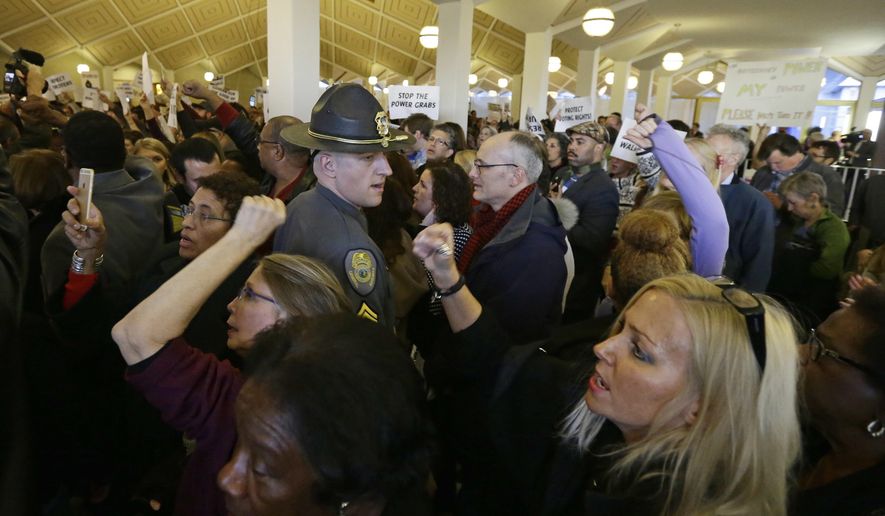RALEIGH, N.C. (AP) - As North Carolina’s political split widens, state business is increasingly being refereed with a judge’s gavel.
A law approved by Republicans last month restricting new Democratic Gov. Roy Cooper’s power over elections is on hold, by court order. Cooper’s effort to expand Medicaid through the federal health overhaul was blocked temporarily Saturday by a federal judge after GOP legislative leaders sued.
And a law governing transgender people using public bathrooms is currently stuck in court.
The drawn-out legal fights that seem to have become a routine part of lawmaking are expensive for the litigants and often leave public policy in limbo.
The swarm of lawsuits reflects a tug-of-war between Republicans, who have controlled the General Assembly since 2011, and their Democratic opponents.
Democrats say the reliance on the courts is a byproduct of gerrymandered legislative districts that favor Republicans in a closely divided state.
“Legislators in Raleigh, based on the maps that they have drawn, are not representative of North Carolina,” said Chris Brook, legal director for the North Carolina ACLU. “And when that happens, there are limited checks and balances outside of the judicial system.”
Former state Rep. Paul Stam, a social conservative, said federal litigation increased because the 4th U.S. Circuit Court of Appeals shifted to the left with judges appointed by President Barack Obama.
Stam said “the left saw that the 4th Circuit had changed, so they said, ’we’ll just go to court more in federal court.’”
He also accused Democrats and their allies of filing lawsuits in state court, like an unsuccessful one challenging taxpayer funds for children to attend private or religious schools, to give them campaign issues.
As of September, Republican legislative leaders had spent more than $10 million on outside lawyers to defend laws in more than a dozen cases since 2011. That doesn’t count work by state lawyers.
Redistricting litigation has been common since the 1980s. But Gerry Cohen, a retired legislative staff attorney, said now “there’s more willingness to use the judicial branch to settle constitutional disputes” of other kinds.
“It certainly seems like a lot,” he added.
Adding to the legal volatility, the governor’s mansion changed party hands twice since 2012, said professor Neal Devins at William & Mary Law School in Virginia. Former Republican Gov. Pat McCrory, who lost to Cooper in November, signed several contentious laws.
Devins said increasing political polarization nationwide has fueled battles over state laws on hot-button issues like same-sex marriage, abortion and gun control.
In a paper on litigation over state abortion laws, Devins said bills on such issues are often passed at least partly to win points with constituents, regardless of whether they’ll withstand a legal challenge. He wrote that “what matters most is taking a position - not the judicial validation of that position.”
While Cooper isn’t shying away from court, he said in his inaugural speech that’s not how he wants to govern: “I want every elected official to hear me when I say: I refuse to spend the next four years engaging in political brinkmanship - because we’ve got too much work to do for the people who need our help.”
Three days later, Cooper expanded his lawsuit over new laws reducing or checking his power.
Over the summer, voting rights advocates successfully sued to gut a 2013 elections law that required photo ID for voting in-person and scaled back early in-person voting. A separate GOP-sponsored law allows magistrates with religious objections to refuse to perform same-sex marriages. A federal court dismissed a lawsuit challenging that law; the court’s decision is being appealed.
In suing to block Cooper’s Medicaid expansion, House Speaker Tim Moore and Senate leader Phil Berger said it wasn’t “a decision we’ve made lightly - but unfortunately our multiple attempts to amicably convince Gov. Cooper to follow the law have fallen on deaf ears.”
No matter which side wins in court, the results can be messy for citizens. After provisions of the voting law were overturned, counties scrambled to alter early voting hours amid partisan disagreements and Republican activists sued over how same-day registrants’ ballots were counted.
Voters are also caught in the fight over legislative districts. A federal court had ordered new maps and a special 2017 election. That was frozen for now by the U.S. Supreme Court.
Litigation over the “bathroom bill” has also been inching through the courts. The law dictating who may use which restroom in many public buildings and limiting other LGBT protections has prompted economic backlash.
It also brought lawmakers back for a December special session that failed to reach a solution, making it more likely a court will decide its fate.




Please read our comment policy before commenting.